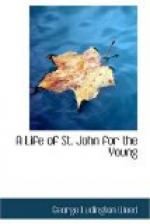[Illustration: CHRIST BEFORE CAIAPHAS Old Engraving Page 176]
The moment had come when He must deny Himself even the little comfort and strength of the immediate presence of the three. So saying, “Tarry ye here and watch with Me,” He turned away. They must not follow Him to the spot of His greatest conflict. There He must be alone, beyond the reach of human help, however strong or loving. Even that which He had found in the few moments since leaving the garden entrance must end. Their eyes followed Him where they might not follow in His steps. It was not far. “He went forward a little.” “He was parted from them about a stone’s cast”—probably forty or fifty yards. This separation implies sorrow. They were near enough to watch His every movement as He “kneeled down” and “fell on His face to the ground” They were near enough to hear the passionate cry of love and agony, “O, My Father.” This is the only time we know of His using this personal pronoun in prayer to His Father. He thus showed the intensity of His feeling, and longing for that sympathy and help which the Father alone could give.
On Hermon the glories of the Transfiguration were almost hidden from the three disciples by their closing eyes. And now weariness overcame them in the garden. They too fell to the ground, but not in prayer. They tarried indeed, but could no longer watch.
They had seen Moses and Elijah with their Lord on the Holy Mount, but probably did not see the blessed watcher in the garden when “there appeared unto Him an angel from heaven strengthening Him” in body and soul. So had angels come and ministered unto the Lord of angels and men in the temptation in the wilderness.
“Being in agony He prayed more earnestly” until mingled blood and sweat fell upon the ground. The heavenly visitants on Mount Hermon in glory had talked with Him of His decease now at hand. The cup of sorrow was fuller now than then. He prayed the Father that if possible it might pass from Him. Then the angel must have told Him that this could not be if He would become the Saviour of men. He uttered the words whose meaning we cannot fully know, “Not My will, but Thine, be done.”
The angelic presence did not make Him unmindful of the three. “He rose up from His prayer,” and turned from the spot moistened by the drops of His agony. With the traces of them upon His brow, “He came unto the disciples.” How much of pathos in the simple record, “He found them sleeping.” Without heavenly or earthly companionship, His loneliness is complete.
“’Tis midnight;
and from all around,
The Saviour
wrestles ’lone with fears;
E’en that disciple
whom He loved,
Heeds not
His Master’s griefs and tears.”
The head that reclined so lovingly on the bosom of the Lord in the Upper Room now wearily rests on the dewy grass of Gethsemane. The eyes that looked so tenderly into His, and the ear that listened so anxiously for His whisper, are closed.




